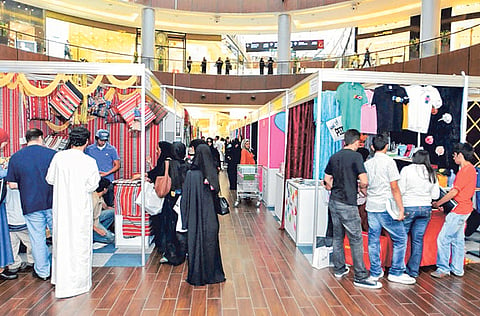SME law to boost business climate of this sector
Law aims to encourage Emiratis to start and run SMEs

Dubai: A newly passed law aims to unify the voices of SMEs, allowing them to address their issues loudly and strongly under a dedicated SME Council.
This council will look into the required rules and regulations needed it to boost this sector, according to Abdul Baset Al Janahi, CEO of Dubai SME, an integrated division of the Department of Economic Development.
“While there are different SME programmes across the emirates, the new law will unite these programmes under one legal and federal umbrella,” Al Janahi said.
President His Highness Shaikh Khalifa Bin Zayed Al Nahyan has approved Federal Law No 2 of 2014, which will categorise SMEs, establish the dedicated council and determine incentives to be offered to small business owners. Under the legislation, federal authorities and ministries must contract at least 10 per cent of their procurement budget for purchasing, with SMEs.
One of the goals of the legislation was to help raise the contribution of SMEs to the country’s Gross Domestic Product (GDP), which is expected to reach 70 per cent by 2021 according to Sultan Bin Saeed Al Mansouri, UAE Minister of Economy.
Currently, SMEs contribution to GDP estimated at 60 per cent, according to the Ministry of Economy.
The SME sector makes up almost 92 per cent of the total number of companies that operate in the country and employ more than 86 per cent of the private sector workforce.
While financing is the main obstacle facing SMEs, the new law identified the Emirates Development Bank as a main channel for financing by allocating 10 per cent of its capital to finance local SMEs.
Private banks
The Emirates Development Bank is a government lending body set up in 2011 with a Dh10 billion capital to help to promote economic growth.
Al Janahi told Gulf News that Emirates Development Bank will not solve the issue of SME financing completely.
“It will help facilitate the financing procedures but one bank is not enough as other private banks should be encouraged and take part of this process,” he said.
It is the Central Bank’s responsibility to encourage other banks to allocate a percentage of their portfolio to financing SMEs, he added.
According to him, the main aim behind this law is to create a healthy business climate in this sector that will enable and encourage Emiratis to start up their business.
Out of 300,000 SMEs registered in the UAE, only 3 per cent of them are local entrepreneurs, Al Janahi said.
Mareyah Mohammad, an Emirati entrepreneur, said that this law will help improve the competitiveness of small and medium enterprises, create new job opportunities for UAE nationals, encourage them to work in this sector and boost the country economy overall.
“This law is an important step forward in the efforts to encourage citizens to enter the private sector through enterprises of their own, enabling them to achieve success through creativity and innovation. It is now possible for them to benefit from the provisions of the law to ensure the success of their projects,” she added.
Energise sector
Hazem Al Hajjaj, CEO Micro Automation Industries, and one of Dubai’s Top 100 SMEs, ranked by the Department of Economic Department based on performance said that the new law serve as a good incentive for local SMEs.
“But if the SME business environment is improved, expatriate SMEs will benefit indirectly especially in the financing issue,” he added.
According to SME consultant, Jitendra Gianchandani, Chairman and Managing Partner of Jitendra Consulting Group, said that the law will energise the SME sector across the UAE.
However, he added that entrepreneurs should be knowledgeable and more responsible.
“Unfortunately majority of the SMEs don’t provide proper books of accounts, also they don’t prepare concrete business plans and development strategy,” he said.
“Thus, financing SMEs is very risky due to lack of transparency,” he said.
He added that most of the UAE programmes that support SMEs are trying to bridge this gap between SMEs and banks, but mainly to UAE nationals.
However still this is a positive move and I hope it will be extended to all SMEs in the UAE market,” Gianchandani said.
Initiatives
Though economists consider SMEs as an engine of growth for the economy, to banks, SMEs, especially new ones, are like Titanic, it will sink them, Gianchandani said.
Al Janahi said that Dubai SME launched initiatives that five per cent of government purchasing in Dubai should be made from SMEs.
The legislation grants SMEs exemptions from customs tax for equipment, raw materials and goods for production purposes. It also exempts them from paying bank guarantees that companies must pay per new worker.
The total value of the exempted amount that the members of Dubai SMEs enjoyed is estimated at Dh1.4 billion in the last ten years.
Emirati business owners will also benefit from land grants for industrial or agricultural purposes and receive support for promoting their companies at exhibitions around the world.
The law also includes additional benefits to inventors, patent owners and companies that invest in research and development.
Sign up for the Daily Briefing
Get the latest news and updates straight to your inbox


